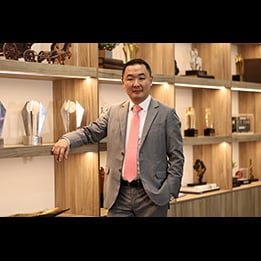

Chief legal officer | Tegra Incorporadora



Dan Suguio
Chief legal officer | Tegra Incorporadora
Team size: 23
How do you approach managing legal aspects during periods of instability or crises, and how does your legal strategy align with the broader business strategy to ensure the organisation’s resilience?
In times of instability or crisis, the legal department plays an even more important role for the organisation, ensuring the necessary legal security for the business. However, all legal professionals must be business-oriented in order to understand and meet the company’s long-term objectives, since crises and instability are temporary, but business is not.
What are the major cases or transactions you have been involved in recently?
Acquisition and Development of BRL 780 million residential real estate project in Rio de Janeiro.
Ongoing reorganisation of a plot development company (I’m currently CEO of Tamboré Urbanismo S.A. a company controlled by Tegra).
What measures has your company taken to embed sustainability practices into its core business operations, and how does the role of the general counsel contribute to driving and ensuring sustainable practices within the company?
Tegra is a market leader in sustainability practices. We are an AQUA-HQE (High Environmental Efficiency) certified company, in addition to the gold seal of the Brazilian Greenhouse Gases (GHG) Protocol program, with our integrated report audited by E&Y and published annually. We also have the pro-ethics seal, granted by the Federal Comptroller General’s Office (CGU) of the federal government, in recognition of Tegra’s Integrity Program. Finally, we are certified by Great Place to Work (GPTW) for the sixth consecutive year. As GC, I work on all ESG fronts of the company to ensure alignment with good practices and compliance with all applicable standards and laws.
What emerging technologies do you see as having the most significant impact on the legal profession in the near future, and how do you stay updated on these developments?
AI is certainly one of the most important tools for the future of legal activity. With the 4.0 revolution, tools such as AI, robotics, the Internet of Things, cloud computing and big data are fully integrated to our activity. Professionals must adapt to this new reality, or they will quickly become obsolete. The biggest challenge is still having the discernment to evaluate what is produced by AI, and for this reason, experienced professionals are still needed.
How do you prioritise diversity and inclusion within your legal department, and what initiatives have you implemented to foster a more inclusive and equitable work environment?
Diversity cannot be treated as a hype. Diversity is essential to prepare companies for a new reality, to engage with new audiences and different generations. I participate in discussion groups inside and outside the company on the topic of diversity, always seeking new practices and learning that can be applied in the company.
In your opinion, what are the main trends that are salient in your country currently (these can be legal, political, economy or business-based)?
The biggest challenge today is the workforce and changes in the traditional work model. The Brazilian tax reform itself will have a major impact on labour relations and application of technologies in all industries. At the same time, I see an exponential growth in technology applied to all fields, not just the legal field. Resources such as AI will be increasingly present in our daily activities and will require full immersion and recycling of professionals who are not digital natives.